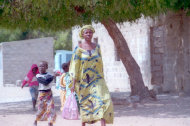A 10-year-old girl, pregnant with twins after being
raped by her neighbour, is being forced to continue her pregnancy, after
human rights campaigners lost their fight to secure a legal abortion.
The case of the girl, who lives in the southern region of
Zinguinchor, Senegal, highlights the price women and children are paying
for archaic abortion laws in the country.Fatou Kiné Camara, president of the Senegalese women lawyers' association, told the Guardian: "She is going to have to go through with the pregnancy. The best we can do is keep up pressure on the authorities to ensure the girl gets regular scans and free medical care".
She added: "Senegal's abortion law is one of the harshest and deadliest in Africa. A doctor or a pharmacist found guilty of having a role in a termination faces being struck off. A woman found guilty of abortion can be jailed for up to 10 years."
The women lawyers' association is campaigning for MPs to change the country's abortion legislation with the African charter on women's rights. Legal medical abortion in circumstances of rape and incest, in which a woman's physical and mental health is at risk, have not been added to the statute book.
It is estimated that hundreds of Senegalese women die each year from botched illegal abortions. According to official figures, around 40 women were held in custody on charges linked to abortion or infanticide in the first six months of the year.
Camara said: "For a termination to be legal in Senegal, three doctors have to certify that the woman will die unless she aborts immediately. Poor people in Senegal are lucky if they see one doctor in their lifetime, let alone three."
She added: "A single medical certificate costs 10,000 CFA francs ($20), which is prohibitive. We had a previous case of a raped nine-year-old who had to go through with her pregnancy. We paid for her caesarean but she died a few months after the baby was born, presumably because the physical trauma of childbirth was too great."
Camara, a law professor at Cheikh Anta Diop University in Dakar, said abortions were readily available to wealthier women at private clinics. Yet poor women are "expected to go through the legal motions or risk your life in a backstreet clinic".


Aucun commentaire:
Enregistrer un commentaire